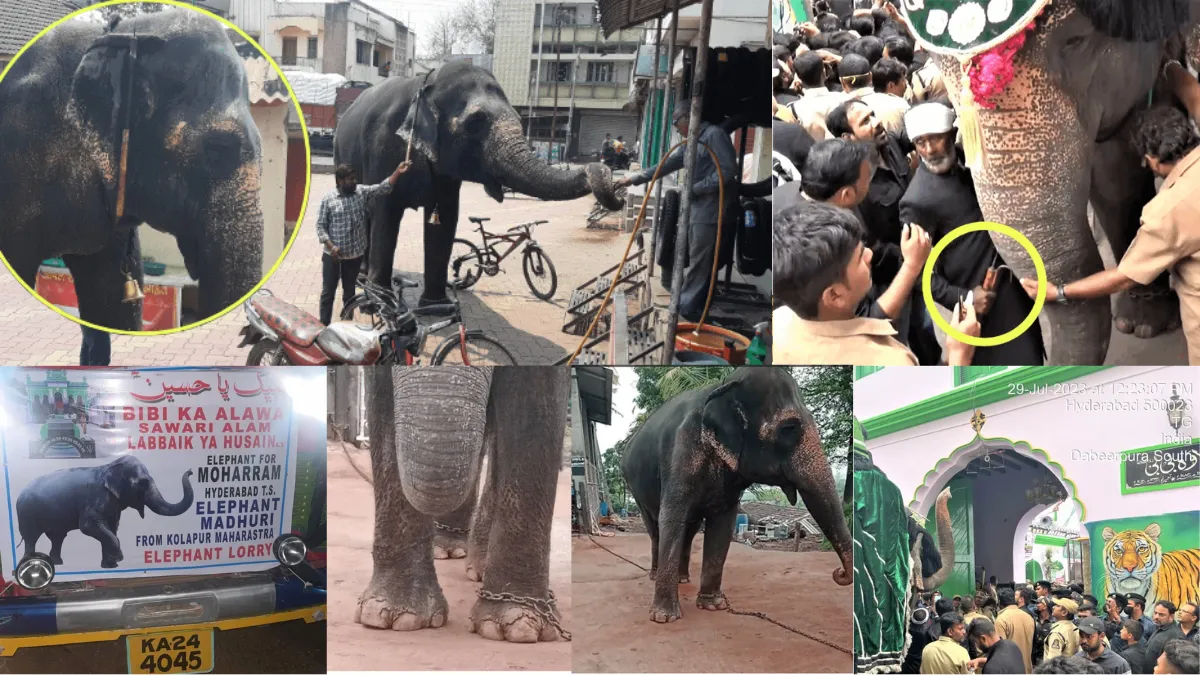Vantara Jamnaga: The complete story of Mahadevi-Madhuri is a heart-wrenching yet inspiring journey of an elephant who spent 33 years in chains, living in solitary confinement, before finally being rescued and relocated to a sanctuary. Her life reflects the cruelty animals silently endure and the power of compassion and justice when people come together to do what is right.
33 Years of Captivity: The Same Slab, the Same Path
For over three decades, Mahadevi (also known as Madhuri) stood on a single slab of concrete and walked the same path every day — bound in iron chains, controlled by a sharp ankush (a hooked rod), and often dragged through religious processions with tight ropes tied around her abdomen.
While we attended school, graduated, got married, raised children, and lived freely, Mahadevi was locked away in solitary confinement inside the Swastishree Jinsen Bhattarak Pattacharya Mahaswami Sansthan (Jain Math) in Nandani village, Kolhapur. She never had the chance to interact with another elephant or feel the jungle beneath her feet.
A Childhood Stolen
At just three years old, Mahadevi was separated from her mother and brought to the Jain Math — reportedly from Karnataka. From that point, she lived alone in a concrete enclosure, far from the forest she belonged to.
She was controlled using an ankush and forced to beg in nearby villages.
An Outburst of Pain and Trauma
In 2017, after decades of loneliness and suffering, Mahadevi fatally attacked the chief priest of the Math. Such incidents are sadly not rare — elephants kept in cruel and unnatural environments often lash out due to extreme psychological stress.
Even after this tragic event, Mahadevi continued to be used to wrap children in her trunk for money.
Political Intervention and Support for Rescue
After the death of the chief priest, the temple trustees and former Member of Parliament, Mr. Raju Shetti, urged the forest department to take Mahadevi into custody and send her to a zoo. However, by 2020, Mr. Shetti met with PETA India and supported the idea of rehabilitating Mahadevi instead.
Exploiting Her for Profit
From 2012 to 2023, the Jain Math illegally transported Mahadevi across state borders at least 13 times for participation in public processions. Once the Math discovered she could be rented out, they turned her suffering into a source of income.
In 2022–2023, she was taken to Telangana to participate in a Muharram procession.
Legal Action and Government Seizure
On 30 July 2023, the Telangana Forest Department seized Mahadevi under Section 48A of the Wildlife Protection Act, 1972, due to illegal transportation. Custody of Mahadevi was then handed over to the Maharashtra Forest Department. From that point, she was no longer considered temple property but a government-seized animal.
On 20 June 2024, the Chief Wildlife Warden of Maharashtra wrote to the Honourable Supreme Court’s High-Powered Committee, recommending Mahadevi’s rehabilitation.
Severe Health Complications
Years of standing on concrete in chains had taken a terrible toll on her body. Mahadevi developed grade 4 arthritis, foot rot, overgrown nails, and severely worn footpads.
A Supreme Court Victory for Compassion
On 28 July 2025, the Supreme Court of India dismissed the Jain Math’s appeal against the Bombay High Court’s order dated 16 July 2025. The court prioritized Mahadevi’s welfare and instructed authorities to transfer her to a sanctuary with her comfort and health as the top priority.
Resistance and Violence During Rescue
Despite the Supreme Court’s orders, Mahadevi’s rescue from the temple was met with violent opposition. Mobs hurled hundreds of stones at the rescue team, injuring a PETA India staff member severely — he suffered a serious rib injury from a direct hit.
A New Beginning at Vantara Jamnaga
On 30 July 2025, after 33 painful years, Mahadevi finally arrived at her new home — the Radhe Krishna Temple Elephant Welfare Trust (RKTEWT) under Vantara Jamnaga. Here, she will no longer live in chains or fear, but will be surrounded by other elephants and cared for by world-class veterinarians. Her treatment will include hydrotherapy and other medical support for her arthritis and overall recovery.
Offering a Humane Alternative
PETA India and the Federation of Indian Animal Protection Organizations (FIAPO) have offered the Jain Math a mechanical elephant to use in temple rituals. This move promotes a compassionate alternative that avoids animal suffering while still respecting cultural practices.
The Real Message Behind The Complete Story of Mahadevi-Madhuri
The complete story of Mahadevi-Madhuri is more than just an account of a rescued elephant — it’s a symbol of hope, resilience, and the urgent need to replace cruelty with compassion. Her journey from chains to sanctuary shows what is possible when laws are upheld, and animals are seen as sentient beings, not tools.
Also read: What is PETA India: A Complete Guide to the Organization’s Mission and Impact,PETA full form
Quick Facts Table: Mahadevi-Madhuri
| Attribute | Details |
|---|---|
| Name | Mahadevi (Madhuri) |
| Gender | Female elephant |
| Origin | Karnataka to Kolhapur, Maharashtra |
| Captivity Duration | 33 Years (1992–2025) |
| Location of Captivity | Jain Math, Nandani village |
| Health Issues | Grade 4 arthritis, foot rot, overgrown nails |
| Legal Status | Seized by government (2023) |
| Sanctuary | RKTEWT, Vantara – Jamnagar |
| Rehabilitation Date | 30 July 2025 |
Also read: PETA India Full Form: Purpose, Work, and Impact on Animal Rights in India
Conclusion: The complete story of Mahadevi-Madhuri
The complete story of Mahadevi-Madhuri is a powerful reminder of the resilience of animals and the responsibility humans bear to protect them. After enduring 33 years of unbearable pain, isolation, and exploitation, Mahadevi’s rescue and rehabilitation mark a significant victory for animal welfare in India.
Her journey from captivity to freedom not only highlights the cruelty faced by many temple elephants but also reflects the strength of legal systems, organizations like PETA India, and compassionate individuals who fight for justice.













